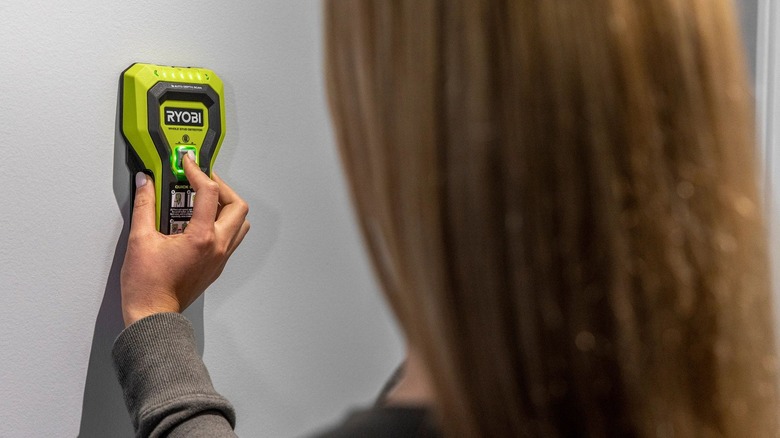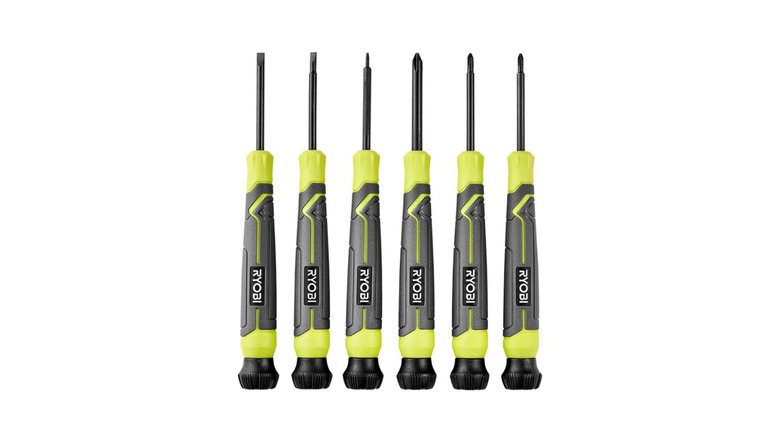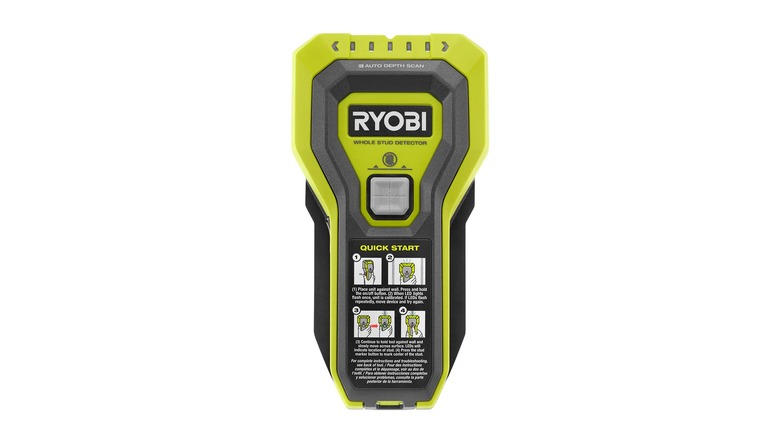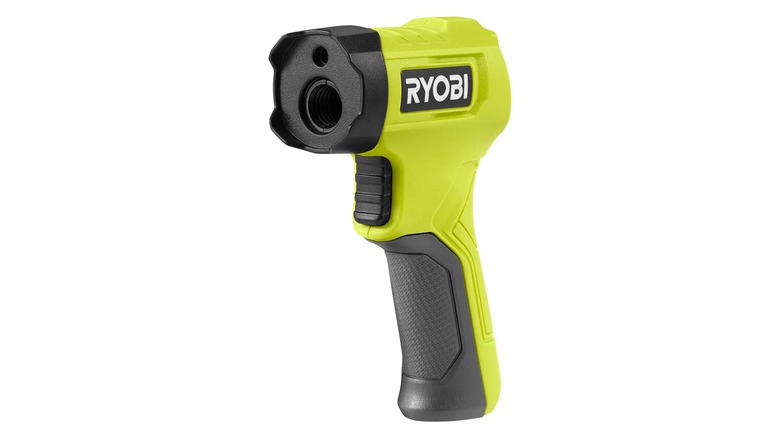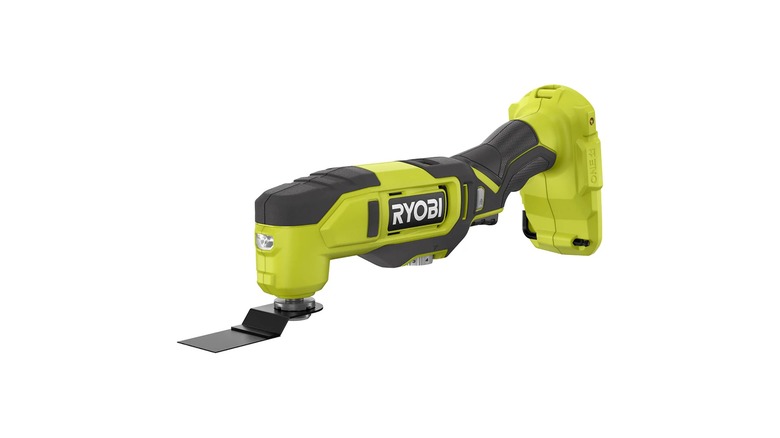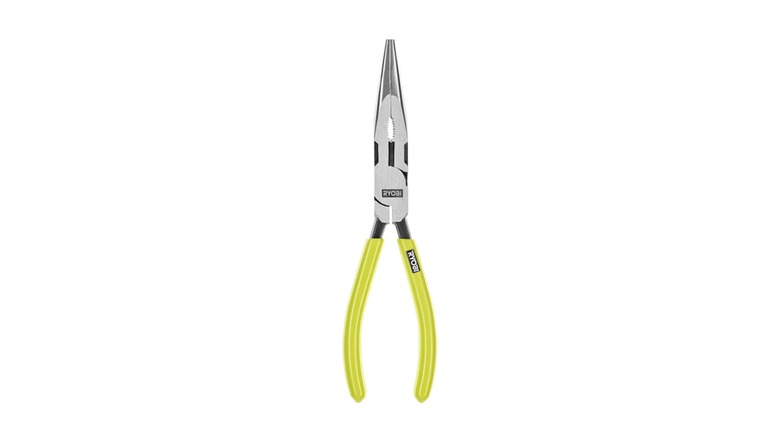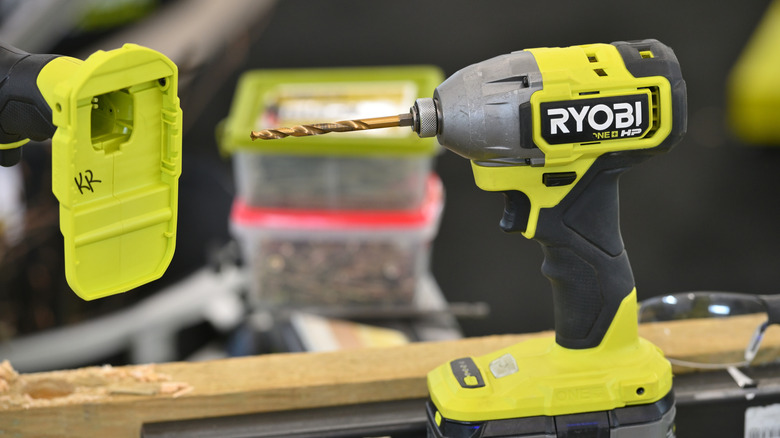5 Of The Best Ryobi Tools For Electricians, According To Users
Among professional tool users, electricians frequently find themselves working on specific jobs that quickly turn into much larger repair projects. Fixing an outlet can require some exploration in the cavity wall beneath the surface, and adding new nodes on an electrical network almost always demands some precision cutting work and widespread installation expertise that rises beyond the parameters of just a wiring job. Electricians use a huge range of standard and specialized tools in their approach to even the most basic tasks, as well. Even with this in mind, it's important to zoom in on some of the most impactful tools that electricians will take out of their tool bag while on the job.
Whether you're a DIY sparky or a professional, Ryobi can be a solid option to help navigate the complex world of electrical work. Ryobi is a favorite among those managing their own home, but the brand's historical timeline shows a steady pattern of growth across the board. Pros largely gravitate toward their own favorite brands, but this one's modern catalog of equipment is more than capable of standing up to the demands of a professional repair or installation job. Even true haters of the brand will likely come around on numerous Ryobi tools. These five tools in Ryobi's classic lime green can make a big difference for electricians and wiring tasks more broadly.
Six-Piece Precision Screwdriver Set
An undeniable essential in any electrician's toolkit is a set of precision screwdrivers. The standard screwdriver remains an important component in any collection, but these specialized fastening tools occupy a special place for those tackling delicate installations or component repairs. When performing critical wire-ups, the precision screwdriver functions as your primary screw turning solution in lighting elements, outlets, and much more. The screws that hold wires in place tend to be much smaller than the standard fasteners that keep these elements attached to the wall or ceiling.
Not all precision screwdrivers are comfortable and easy to use, however. I've personally churned through quite a few sets, both multi-bit options and individual tool sets. The Ryobi Six-Piece Precision Screwdriver Set with Cushion Grip Handles brings together numerous features that electricians, renovators, and other users will want. The back end features a rotating cap that allows you to press into the tool with your palm and still retain turning control. Unlike some other options on the market, this cap is large enough to deliver consistent performance in any user's hand. The grips themselves are cushioned for greater comfort and each of the six screwdrivers come in commonly required blade types. Users at Ryobi's website give this set a 4.5 star average rating.
Whole Stud Detector
Anyone working on finished walls or along ceilings will need to be able to find the studs. There are really only two ways to affirmatively tell where they may be hiding: You can cut a hole in the wall or slap a stud detector on its surface. It might be more fun to start bashing holes, but this is a decidedly less viable approach. This Ryobi Whole Stud Detector goes above and beyond the basic magnetic stud finding tools, offering a quick-start operation and coming with the batteries required to get your search underway immediately. The tool features an auto depth scan function to identify the thickness of a wall up to 1½ inches. This helps in exploring whether you're working with wooden or metal studs. It also offers a built-in stud marker to note the center without stopping to reach for a pencil.
However, the real asset in this tool comes in the form of its numerous LED lights that stretch across the top of the gadget. These light up as you move the stud finder back and forth across the wall to quickly and effectively find and mark both ends, providing users with more confidence in their cutting and fastening, as well as other tasks that require access behind a wall's outer surface. Naturally, this tool is highly rated by users, receiving a 4.7 star average rating.
Infrared Thermometer
A thermometer might sound like something that only doctors and parents need in their toolkit, but there are actually many uses for temperature measurement in renovation, installation, and repair tasks. Ryobi's Infrared Thermometer has received a 4.5 star average rating from users, and can handle temperatures ranging between -4 degrees and 1,022 degrees Fahrenheit. The tool features a distance-to-spot ratio of 8:1, meaning you can measure a 1-foot target area from 8 feet away. That's more than enough range to keep you safe when evaluating hot objects and surfaces, in particular. The tool features an LCD screen with backlighting to deliver accurate and easy-to-read measurements in a flash. However, it should also be noted that the thermometer is not intended for human use.
Although I have never used a thermometer in my own electrical work, I have seen an electrician use one before, and many professionals doling out tips in online blogs and videos note the value of temperature taking in their tasks. A thermometer tool can help you identify problems in an electrical circuit. Issues like arcing can create an abundance of heat. Taking the temperature at an outlet that might be acting up can help you identify this kind of issue. Similarly, if you're dealing with buzzing light switches and electrical fixtures, you may be able to identify problems using your thermometer.
18V ONE+ Oscillating Multitool
The multitool provides an oscillating plunge blade that creates unique cuts unmatched by any other power tool you might find. You'll find one in most professional carpenters' and renovators' toolboxes. The tool is critical in supporting precision cutting needs, and is therefore also a valuable addition for electricians. Specifically, it can minimize collateral damage when cutting out holes. Unlike something like a circular saw, you won't overshoot the boundaries of the cut line with the back edge of the blade.
The Ryobi 18V ONE+ Oscillating Multitool is available with the addition of a battery and charger for the same price as the bare tool on Ryobi's website ($79). This makes it valuable tool with a cost effective price tag. Ryobi also makes a ONE+ HP model that offers faster cuts and easier use, but the price tag and cutting power the standard model brings to the table are seriously valuable, too. Ryobi claims that this tool exhibits the "lowest vibration in its class" while delivering a maximum blade speed of 20,000 OPM. With the correct accessory cutting solution, you can apparently easily slice through drywall, wood, plastic, or even metal stock. It features an adjustable speed dial to lock in the exact cutting parameters you require and users give it resounding feedback with a 4.7 star average rating.
8-Inch High Leverage Long Nose Plier
A good pair of pliers you can rely on should feature cutting grabbing, and general workpiece management functionality, especially when dealing with delicate and small materials. The pliers you tend to reach for can say a lot about the jobs you tend to tackle. There are numerous varieties available on the market, and naturally Ryobi makes a wide range of these hand tools. Among its standout solutions is the 8-Inch High Leverage Long Nose Plier. It should be noted that the tool is listed as unavailable on Ryobi's website, although numerous examples of the solution can be found elsewhere. Another variant of the same tool is also listed on Ryobi U.K. website, and here reviewers give it a perfect 5 star rating.
The pliers' slimmed down profile allows for greater access in recessed spaces or tight fits, and the grip is designed to provide more leverage, so you don't have to squeeze as hard to get a secure grip. It also includes multi-grip zones within the teeth to support all manner of work holding tasks and grabbing demands. The back of the jaws feature an induction hardened cutting edge that won't give up on you even when tackling heavy cutting requirements. The handles of the tool are dipped with Ryobi's classic lime green colorway helping to improve visibility in your toolbox so that you can find this staple easily while on the job.
Methodology
All of these are highly rated by users on Ryobi's site. The picks were made from my own experience working with household electrical systems, from installing new lighting elements to wiring up entirely new outlet chains. I've used every one of these types of tools in my own electrical jobs except for the thermometer. However, professional electricians themselves note the value that an infrared thermometer can bring to inspection tasks while working on fuses, electrical load management, and more.
